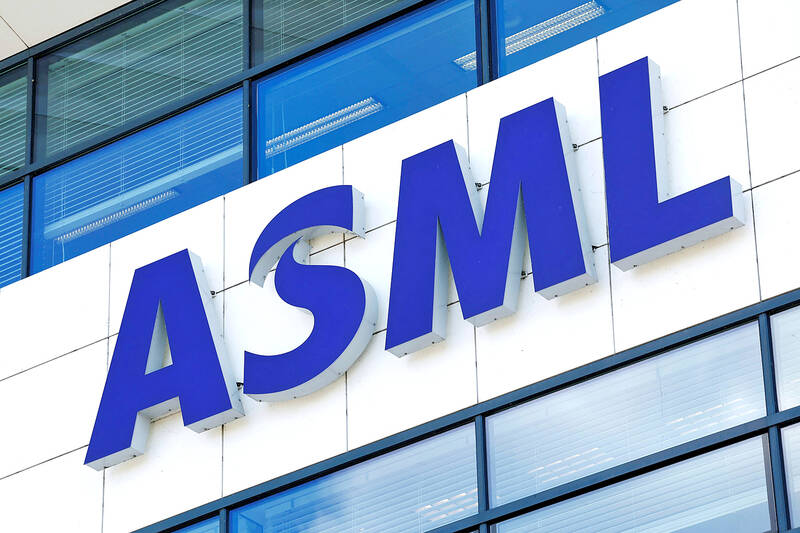ASML Holding NV’s order intake plunged in the third quarter amid a sector-wide slump in the semiconductor industry, leaving the company increasingly reliant on revenue from China.
Order bookings fell 42 percent to 2.6 billion euros (US$2.8 billion) in the July-to-September period from the previous quarter, Europe’s most valuable technology company said in a statement yesterday.
That compared with an average estimate of 4.5 billion euros among analysts polled by Bloomberg.

Photo: Reuters
While ASML maintains a sizeable order backlog, the semiconductor industry has been experiencing a slowdown after inflation and recession fears hit consumer spending.
Slumping demand elsewhere made China ASML’s biggest market last quarter, overtaking Taiwan.
ASML, which is the only producer of the lithography equipment needed to make the most advanced semiconductors, has experienced a jump in business from China this year as chipmakers there boosted orders ahead of looming export controls.
“All in all, on the macro front it’s quite dynamic and quite challenging,” ASML chief financial officer Roger Dassen said in a video interview on the results. “If you then specifically look into the semiconductor industry, I think it’s plain to say that our customers are really going through the cycle trough.”
China accounted for 46 percent of ASML’s sales in the third quarter, compared with 24 percent in the previous quarter and 8 percent in the January-to-March period.
Taiwan was 24 percent, down from 34 percent in the second quarter.
ASML has been targeted by the US effort to curb exports of cutting-edge technology to China.
Earlier this year, US President Joe Biden’s administration convinced the Dutch government to prevent ASML from shipping some immersion deep ultraviolet lithography machines, its second-most advanced product line, to China without a license.
The Dutch restrictions are set to take full effect from Jan. 1.
The US on Tuesday announced additional export curbs that are designed to block China’s access to advanced semiconductor technology.
ASML said the new measures would affect its sales there in the medium to long term.
ASML is already barred from selling its most advanced equipment, known as extreme ultraviolet machines, to China.
The firm has said that it does not expect the Dutch and US measures to have a material impact on its financial outlook for the year or in the longer term.
ASML’s revenue next year is expected to be similar to this year, Dassen said.
“On the other hand, we believe 2024 is going to be a pivotal year in preparing us for what we think will be very significant growth in 2025,” he said.
Revenue is on track for 6.7 billion euros to 7.1 billion euros in the fourth quarter, compared with net sales of 6.7 billion euros in the previous period, the company said.
The forecast compares with analysts’ average estimate of 6.91 billion euros, a Bloomberg survey showed.
“We continue to see the industry as being in the early stages of a new upcycle, with industry fundamentals and ASML’s orders expected to steadily improve,” Jefferies analyst Janardan Menon said in an e-mailed note.

Taiwan Semiconductor Manufacturing Co (TSMC, 台積電) secured a record 70.2 percent share of the global foundry business in the second quarter, up from 67.6 percent the previous quarter, and continued widening its lead over second-placed Samsung Electronics Co, TrendForce Corp (集邦科技) said on Monday. TSMC posted US$30.24 billion in sales in the April-to-June period, up 18.5 percent from the previous quarter, driven by major smartphone customers entering their ramp-up cycle and robust demand for artificial intelligence chips, laptops and PCs, which boosted wafer shipments and average selling prices, TrendForce said in a report. Samsung’s sales also grew in the second quarter, up

LIMITED IMPACT: Investor confidence was likely sustained by its relatively small exposure to the Chinese market, as only less advanced chips are made in Nanjing Taiwan Semiconductor Manufacturing Co (TSMC, 台積電) saw its stock price close steady yesterday in a sign that the loss of the validated end user (VEU) status for its Nanjing, China, fab should have a mild impact on the world’s biggest contract chipmaker financially and technologically. Media reports about the waiver loss sent TSMC down 1.29 percent during the early trading session yesterday, but the stock soon regained strength and ended at NT$1,160, unchanged from Tuesday. Investors’ confidence in TSMC was likely built on its relatively small exposure to the Chinese market, as Chinese customers contributed about 9 percent to TSMC’s revenue last

With this year’s Semicon Taiwan trade show set to kick off on Wednesday, market attention has turned to the mass production of advanced packaging technologies and capacity expansion in Taiwan and the US. With traditional scaling reaching physical limits, heterogeneous integration and packaging technologies have emerged as key solutions. Surging demand for artificial intelligence (AI), high-performance computing (HPC) and high-bandwidth memory (HBM) chips has put technologies such as chip-on-wafer-on-substrate (CoWoS), integrated fan-out (InFO), system on integrated chips (SoIC), 3D IC and fan-out panel-level packaging (FOPLP) at the center of semiconductor innovation, making them a major focus at this year’s trade show, according

DEBUT: The trade show is to feature 17 national pavilions, a new high for the event, including from Canada, Costa Rica, Lithuania, Sweden and Vietnam for the first time The Semicon Taiwan trade show, which opens on Wednesday, is expected to see a new high in the number of exhibitors and visitors from around the world, said its organizer, SEMI, which has described the annual event as the “Olympics of the semiconductor industry.” SEMI, which represents companies in the electronics manufacturing and design supply chain, and touts the annual exhibition as the most influential semiconductor trade show in the world, said more than 1,200 enterprises from 56 countries are to showcase their innovations across more than 4,100 booths, and that the event could attract 100,000 visitors. This year’s event features 17